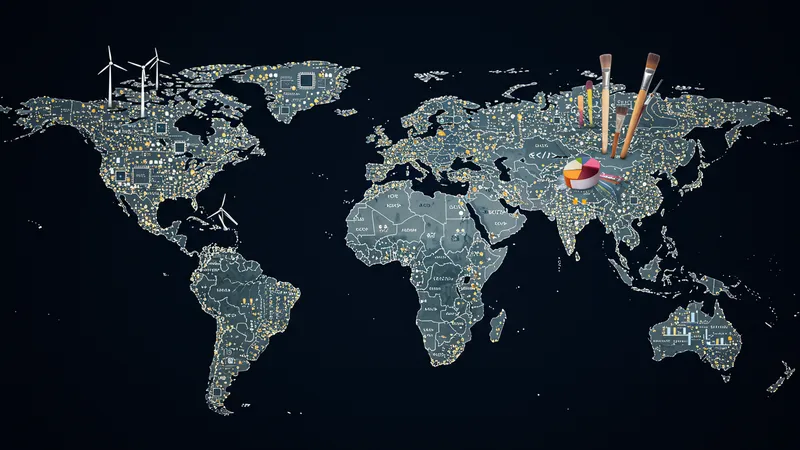
Imagine doubling your salary in just 12 months by enrolling in a course — it's not just possible, it's happening. The secret? Purchase upskilling programs are creating success stories worldwide.
With the job market evolving faster than ever, acquiring new skills isn't just an advantage; it's a necessity. Upskilling could be the difference between staying stagnant and reaching new career heights.

You might think upskilling is just a trend, but did you know companies are prioritizing employees who are constantly learning? They see upskilled workers as more adaptable and innovative. Big companies like Google and Amazon are encouraging continuous learning. But that’s not even the wildest part…
Astonishingly, studies show that individuals who invest in upskilling programs increase their chances of promotion by 30%. On top of that, learners often report improved job satisfaction and confidence. What does this mean for the future workplace? Perhaps upskilling isn’t just an individual game-changer, but a collective revolution in how we view professional growth. But that’s not even the wildest part…
Are you ready to uncover the deeper truths behind these programs that have the experts baffled? What happens next shocked even the experts…
In today’s competitive landscape, investment in learning pays direct dividends. Career experts highlight a revealing pattern: upskilled professionals are not just ascending the corporate ladder; they're doing so at an unprecedented speed. A crucial factor? The tangible salary uplifts. It’s recorded that employees who complete recognized upskilling programs see an average salary increase of up to 28%. But there’s one more twist that catches everyone by surprise…

Knowledge is power, especially when monetized effectively. Take, for instance, skills related to data analysis — a domain anticipated to create over a million job roles by 2025. Upskilling in data science can translate to salary hikes of 50% for many tech workers. However, what many don’t realize is how swiftly these skills can be mastered: courses often span only a few weeks or months. But what you read next might change how you see this forever…
Do current educational paths need reevaluation? While traditional degrees once promised stable futures, many now see upskilling as the new standard. Surprisingly, even seasoned professionals in industries like law and medicine are adopting tech-based courses to stay relevant. This divergence from conventional paths tells a compelling story of changing job landscapes. But there’s an upcoming revelation that’s even more astounding…
Statistics show that 65% of today’s students will work in jobs that haven’t been invented yet. This mind-boggling figure speaks to the necessity of constant skill renewal. Upskilling, therefore, is not merely about personal ambition but preparing for unseen futures. The educational shift occurring is revolutionary, and discovering the next big trend could reshape future workforce strategies. Keep reading to unveil more about this transformative movement...
Corporations are waking up to the undeniable benefits of upskilling, but why is this trend taking the workplace by storm? Corporate giants have discovered that a well-trained workforce significantly boosts productivity and innovation. Training in emerging technologies not only aligns with future goals but also invigorates a company’s ethos. And for those wondering how deep this change goes…

A massive shift is evident in how budgets are allocated. In recent years, companies like IBM and Microsoft are reportedly spending millions annually on employee development programs. They’re going beyond merely filling gaps by transforming employees into dynamo innovators. Programs such as internal courses and workshops are designed to foster creativity and problem-solving skills. But there’s an unexpected twist in this trend…
While you might anticipate that only tech roles benefit from such programs, the reality is staggeringly different. Non-tech sectors such as finance, healthcare, and even retail are emphasizing skill advancement. Upskilling has democratized opportunities across fields, with lessons on leadership, emotional intelligence, and business strategy skyrocketing. The broad adoption has a ripple effect few anticipated…
Businesses aren't just content with internal advancements; there's a competitive warp taking play. Upskilling is quickly becoming a point of attraction to new job talents who want to ensure their future growth. Companies that prioritize employee education not only retain their best talents but attract top-tier candidates. The results of this are redefining HR strategies and the business world as we know it. What lies ahead could change everything you thought you knew about career progression…
It’s easy to consider upskilling purely from a career standpoint, but the personal growth it inspires is profound. People find that pursuing new skills opens more than professional doors — it reshapes confidence and personal achievement. Say goodbye to fear-driven decisions; the age of self-empowerment through education is here!

Individuals often report gaining newfound self-assurance as they master complex topics. This is much more than learning; it's about redefining personal and professional identities. Consider the massive industry shift: life coaching programs are now integrating upskilling modules to enhance client breakthroughs. But what happens when personal growth transcends the job market? Read on for a surprising insight…
The moment people begin to value education for self-fulfillment, a cascade of opportunities unveils itself. Personal projects, side businesses, or even simple tasks become gateways to fulfillment. Astonishingly, the confidence from upskilling for pleasure rather than pressure fuels even greater results. Could the ripple effects of this change be even more significant than projected? Find out what’s really shifting…
In an astounding turn of events, societal expectations are being rewritten; individuals are seeking education driven not by necessity but by passion. This passion is not only fostering ambition but creating a culture of continuous learners. Such transformation suggests we might be standing on the precipice of a cultural revolution built upon these learning habits. The forthcoming pages reveal the layers of this incredible shift…
While the benefits of upskilling are plenty, the financial commitment often weighs heavily on many minds. But what if the investment is not as overwhelming as perceived? There’s a stark realization happening: the return on investment from these programs overwhelmingly outweighs the initial costs.

Consider the pricing models of popular platforms, which often never exceed a few hundred dollars yet provide skills equivalent to thousands in revenue potential. The surprising element is how many learners recover their costs through the first raises or promotions post-training. Truly, the smart money is on learning!
If you believe only those making significant financial investments reap rewards, it’s time to rethink. Government schemes and company-sponsored education encourage individuals who can ill-afford lofty fees to take the plunge. These aids are transforming financial accessibility and, as a welcome side effect, diversity within professional fields is improving. But there’s another financial angle hidden here…
The burgeoning trend of industry-specific loans tailored for professional education is taking off. These loans offer reduced interest rates and flexible payback terms tied to salary growth. This innovative option fuels participation from all economic backgrounds and, in turn, changes societal advancement narratives. Could this financial revolution be signaling an irreversible transformation? Dive deeper to see all its layers unfold…
Upskilling isn’t merely a personal journey — it’s becoming a family endeavor. We’re witnessing a unique cultural shift where entire family units are engaging in educational progress together. Is the family that studies together, the one that succeeds together?
A rising trend sees parents, children, and extended family embarking on learning pathways as collective pursuits. This shared experience nurtures important family values like resilience and collaboration. Intriguingly, this trend is claiming to strengthen family bonds like never before. How does this translate into daily family life? The revelations are unexpected…
For many, establishing a household study hour has replaced passive activities. Educational accomplishments are now family affairs, with shared celebrations marking completed courses or learned skills. This joint commitment to self-betterment is proving to model healthy learning attitudes across generations.
Such an innovative approach creates an intriguing offspring effect: children starting their skill acquisition significantly younger than previous generations. This isn’t just changing family dynamics but potentially redefining future educational standards and successes. Learning at home sows a persuasive promise for upcoming generations. Uncover what this could mean for our educational systems and family fabric as you read on…
Behind the burgeoning popularity of upskilling is the rising support from government frameworks. Could policy makers be the pivotal players driving this educational revolution? Governments worldwide are introducing compelling incentives to encourage continuous learning.

The programs themselves are varied and numerous, offering tax breaks, subsidies, and grants. This facilitation extends opportunities to those perhaps hesitant or lacking initial funds. But what’s the larger government agenda at play here? They’re aiming not just for a more educated workforce but a competitive edge in global markets.
This shift reflects a reassuring awareness from policy makers who see lifelong learning as critical to economic stability. By partnering with educational institutions, they lower entry barriers to programs that might appear out of reach for many. These partnerships are proving to be vital in sparking reinvigorated economies, especially in post-pandemic landscapes.
The profound implication of these governmental steps suggests a pivotal transformation at a macro level, stimulating market improvements and sparking job creation. On a broader social scale, could this be a commitment to sustainable growth like we’ve never imagined? A few paragraphs ahead provide more puzzle pieces to this intricate development…
While the advantages of upskilling are vastly publicized, there lies a complex layer of unintended consequences. Are companies and individuals prepared for its broader impacts? As with any paradigm shift, new challenges emerge alongside progress.

Among these are issues of overstimulation and burnout — where packaging intense skill acquisition into short spans might overwhelm learners. Critics argue it could foster unrealistic expectations for perpetual efficiency and productivity. Could this be a bottleneck in our pursuit for innovation?
Moreover, as individuals sometimes find, not all skills learned translate into immediate job openings. This misalignment might lead to frustration and disillusionment, potentially counteracting the purpose of upskilling. Societal integration of skills acquired is a nuance that needs continual addressing.
The extensive focus on upskilling means some may overlook time-honed talents, emphasizing novelty over mastery. This could unsettle industries reliant on seasoned expertise. Does this mean we must balance skill introduction with experiential wisdom more thoughtfully than ever? What’s discovered next might redefine this challenge entirely…
Traditional education faces unprecedented challenges with the rise of upskilling. What steps are schools and universities taking to maintain relevance? Adapting to a swiftly changing landscape is imperative for these institutions to survive.

One emerging pattern is the integration of modular learning, where education providers are blending traditional curricula with microcredentials catered to new digital skills. Universities are partnering with platforms like EdX to offer such flexible learning. But is this adaptation quick enough or strategic enough to stay ahead of the curve?
Some critics argue education systems are slow, laden with bureaucracy, and unable to match the nimbleness of online platforms. This lag gives rise to an educational inequality many hadn’t anticipated. As creators of knowledge, institutions face an urgency to convert theory into applicable, career-ready insights.
These shifts pose deeper questions about the future purpose of education itself. Are we moving toward a system valuing practical skillsets over theoretical underpinnings? As transformations unfold, the educational realm’s reaction will have profound implications for society’s learning pathways. Explore how these evolving dynamics are shaping us…
The employee-employer relationship is shifting in the wake of widespread upskilling. How are employment models evolving to accommodate these changes? Employers are recognizing the need for greater flexibility and innovation in team dynamics.

The traditional nine-to-five model is increasingly being replaced by models supporting adaptability and skill cultivation. Employers prioritize hybrid roles, emphasizing output over presence. Upskilling empowers employees to explore wider responsibilities and satisfy diverse occupational interests.
This shift also implies a reevaluation of job descriptions. Organizations now often prefer dynamic, project-based profiles over static roles. However, some warn that this could lead to job insecurity, with shifting roles challenging job continuity and stability.
There's a crucial balance to be struck between opportunity and security. How will organizations structure support systems to safeguard against potential downside risks? Such questions remain crucial as work models transform in tandem with burgeoning skillsets. Keep reading to see how these challenges are tackled head-on…
Education knows no boundaries, and upskilling reflects this by flourishing globally. How does this phenomenon adapt across cultural landscapes differently? Insights reveal striking variability in focus areas — a testament to the kaleidoscope of skills shaped by regional demands.

Asia, with its booming tech economy, prioritizes digital skillsets profoundly. Meanwhile, Europe witnesses a surge in sustainable development courses, driven by a cultural pivot toward green practices. North America notably intertwines creativity with analytics, reflecting its diverse industrial tapestry.
Such cultural distinctions raise intriguing questions about skill migrations and cross-cultural exchanges. These variances can drive specialized talent mobility, fostering significant international collaborations and partnerships unimagined a decade ago.
Exchanging educational philosophies could catalyze a new era of innovation, blending global standards with localized expertise. Are we transforming into a world community united in skill-based empowerment? As journeys progress, anticipate more revelations on global interconnectivity…
Technology plays an undeniable role in upskilling’s evolution. How are recent advancements pushing boundaries even further? Digital tools are revolutionizing accessibility, providing learners with unprecedented autonomy over their educational journeys.

AI-driven platforms such as Duolingo and Udacity deliver personalized learning experiences, adapting to users' strengths and weaknesses in real time. This interaction supercharges progress, making mastery achievable even by those without traditional academic backgrounds.
Excitingly, immersive technologies like VR and AR transform the learning environment, making technical fields such as engineering more captivating and hands-on. However, with such rapid technological advances, maintaining inclusivity is a pressing concern. Will these innovations Democratize skill acquisition or skew opportunities further?
The symbiotic relationship between technology and upskilling suggests an educational leap forward, poised to redefine learning innovations. As we delve deeper, the symphony of tech and education harmonizes a universe of potential. Discover what this means for the future of learning as you continue on…
As the world becomes increasingly interconnected, upskilling knows no geographical limits. How does this permeate different corners of the globe? Countries experiencing economic transitions are utilizing this momentum to elevate their workforce readiness.

Remote work accelerates this shift, equipping talent pools from developing nations to compete on global stages. Now, digital nomadism embodies a lifestyle supported by skills honed through diverse online platforms. Is this transition forming a new economic diaspora?
One striking evolution sees multi-nationals investing in cross-border learning programs, spanning continents and cultures. Witnessing a merger of Eastern creativity with Western business strategies underlines a rich exchange of capabilities.
More than just an educational trend, upskilling stands as a symbol of international competence. This cross-border education fosters mutual growth and understanding, redefining borders not as dividers but connectors in a universally skillful workforce. Explore these stories of global alliances and competitions yet to unfold…
When crisis hits, education adapts. How has upskilling responded to recent global upheavals? Economic disruptions spur individuals and industries alike toward continuous education to combat uncertainty.

The COVID-19 pandemic accelerated this urgency, compelling many to reassess career paths and develop resilience against volatile markets. Upskilling emerged not just as advancement but a tactical maneuver for job security.
This pressure response has seen sectors expanding their educational offerings for crisis management and remote efficiency, skills with newfound prominence. Praised as timely lifesavers, these interventions hold vital importance in today’s world.
Education as a crisis-response tool redefines how we perceive learning. Could future global challenges be met with this proactive attitude? This strategy entreats preparation, not just reaction, highlighted further in the upcoming pages…
Upskilling is more than a passing trend; it’s a transformative force compelling change across all walks of life. As knowledge becomes power, the essence of upskilling reshapes our foundations, blending individual aspirations with collective progressions.

Ready to push boundaries and redefine your potential? Start your learning adventure now — and be sure to share your insights along the way! Bookmark, discuss, enlighten. The future belongs to the continuously evolving.